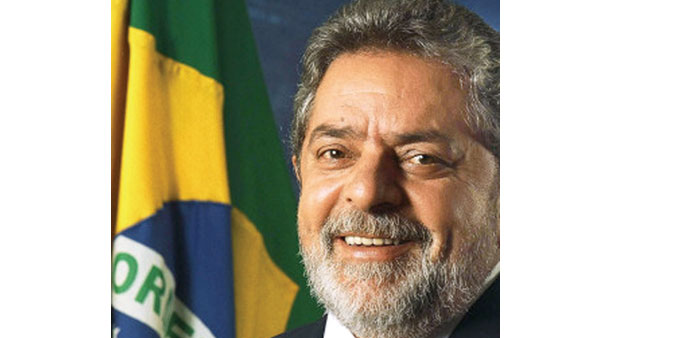Reuters/Rio De Janeiro
Brazil’s supreme court authorised the questioning by police of ex-president Luiz Inccio Lula da Silva in a broadening corruption case focused on state-run oil company Petrobras, a representative for the court said.
The original motion for permission to question Lula as a witness, which was filed last month, said the popular leader “may have benefited” from the political kickback scheme.
Lula may have “secured advantages for himself, for his party ... or for his government by maintaining a base of political support sustained by illicit business” at the company, investigators wrote in the motion.
Prosecutors say there is no investigation into Lula or any evidence tying him to crimes, but they said they think the corruption scheme started with the former president’s chief of staff, Jose Dirceu.
“The people who will be questioned do not bear the status of investigated, but as the motion by the police proposed, the status of informants,” Teori Zavascki, Supreme Court minister, said in his decision.
A representative for Lula in Brazil said the former president “could not be investigated in the Petrobras inquiry because there was no reason for it”.
In the original motion, investigators said it was necessary to question Lula because the probe, and evidence obtained in plea bargain testimony from officials already convicted in the scandal, “reaches the political and partisan nucleus of his government”.
Brazilian President Dilma Rousseff on Friday barred government delays in repaying state-run banks, in an attempt to strengthen her defence ahead of a court ruling on such postponements that could serve as grounds for her impeachment.
Rousseff published a decree to ban delays as she faces potential impeachment on accusations she broke the nation’s fiscal responsibility law by holding off repayments to lenders that had advanced the government money for social programs in a practice known as fiscal “backpedaling”.
The delays helped her government continue funding social programmes while improving the nation’s fiscal accounts ahead of the 2014 presidential election, in which she was narrowly re-elected.
Brazil’s Federal Accounts Court, or TCU, is scheduled to reject or approve Rousseff’s handling of 2014 public accounts on Wednesday.
The presidential decree bans government delays surpassing five days on loan payments from financial institutions.
“The decree aims to strengthen the government’s arguments that there was no regulation at the time that banned that practice,” said Mansueto Almeida, a public accounts expert who has been critical of Rousseff’s fiscal policies.
“If that influences the TCU’s decision it’s hard to say, but it’s definitely a step in the right direction.”
Rousseff’s administration has denied any irregularities. The government is paying in arrears, reducing its savings this year and forcing authorities to slash key fiscal targets.
Although not legally binding, a TCU ruling against the administration would give ammunition for the opposition to seek the impeachment of Rousseff, whose government has been rattled by the country’s worst political and economic crisis in three decades.
The TCU judge leading the case, Augusto Nardes, has recommended the other seven judges vote to reject Rousseff’s accounts, according to two court officials briefed on the matter. Court prosecutors said her government delayed around 40bn reais ($10bn) in payments between 2013 and 2014.
The erosion of the fiscal accounts under Rousseff helped prompt Standard & Poor’s to strip Brazil of its investment-grade rating last month.
To try to avert an impeachment, Rousseff on Friday reshuffled her Cabinet to bolster alliances within her coalition government.
Rousseff, a technocrat who had never run for public office before ascending to the presidency in 2011, has lost control of her alliance as dozens of lawmakers are probed in the country’s biggest-ever corruption case, focused on state-run oil company Petrobras. Some lawmakers have blamed Rousseff for directing the investigation against them, allegations she and prosecutors deny.

Lula Silva.
